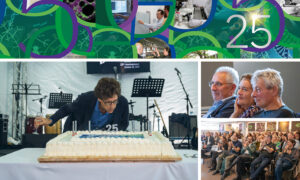
The future of Training (2)
EMBL experts outline the trends shaping scientific training in the coming years

2017 marked the 40th anniversary of EMBL’s course and conference programme and ten years of training at EMBL-EBI. The second part of the mini-series keeps on exploring how EMBL training experts believe scientific training will evolve in the future.
Branching out
Judith Zaugg – Group Leader

There’s no doubt in my mind that interdisciplinarity will continue to be a key element of science, and scientists should be equipped to embrace it. Specialists will continue to exist, scientists will still have an area of expertise, but work fields will be interdisciplinary. An aspect that will be increasingly important in training scientists to thrive in this landscape is computational biology. Biologists need to integrate data generated by different technologies, and computational biology plays a big part in that. Computational expertise is a great skill to acquire. You don’t need to know all the new technologies, but you need to be aware of how to draw on those resources, how to contact the people who have access to them and how to engage them for your cause.
A second element, which is harder to train but equally important, is that scientists need to be open-minded. Learning about topics outside your field can be quite challenging; normally you stay within your field because you are confident there. But it’s enlightening to widen your horizons, to talk to people and not be too shy to ask questions – this has the potential to open up interesting insights for you or others. Most of EMBL’s conferences are already multidisciplinary, so I think attending events like those is a good start. Keeping an open mind, thinking about how you can apply whatever you hear in talks and discussions to your specific problem, is always beneficial.
More data, more openness
Jan Korbel – Group Leader

In recent years, studies around the globe have begun to gather an unbelievable amount of data on the genomics of health and disease. This wealth of data offers exciting opportunities, but it also brings challenges – not just in technical terms but also when it comes to training people to deal with these data.
Studies around the globe generate ‘multidimensional’ datasets, which include information from genomes, transcriptomes, epigenomes, metagenomes as well as clinical and environmental data types. Researchers have to be able to analyse these datasets in an integrated way, if they are to uncover the molecular processes that govern health and disease states.
These datasets were generated with different technologies and methodologies and are stored across multiple data centres on different continents. They are being analysed using different computational workflows. In order to handle the volume and complexity of the data, and make best use of new tools such as cloud computing, we have to work with computer scientists and data scientists. They can help retrieve and standardise the data in such a way that it can be shared and integrated.
This presents us with key training challenges: we need to have training programmes in place to bring biological researchers up to speed. We need to engage with data scientists and cloud architects. They can intuitively understand data structures and know how to navigate large datasets; we need to provide them with an understanding of the scientific questions we’re asking, so they can bring their skillset to bear in pursuit of the answers. Research and training opportunities at EMBL offer exciting prospects to develop the mind-set and skills for this exchange, and are poised to enable exciting future discoveries.


